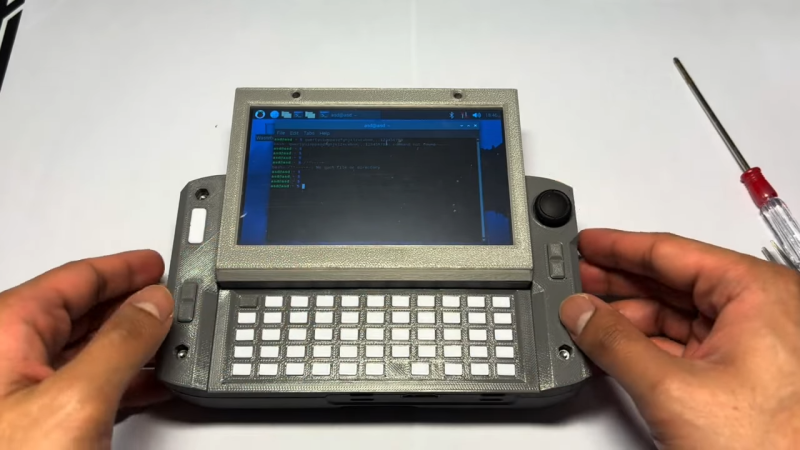The cool thing about building your own computer is that you don’t have to adhere to industry norms of form and function. You can build whatever chunky, awesome thing your heart desires, and that’s precisely what [Rahmanshaber] did with the MutantC cyberdeck.
The build is based around a Raspberry Pi Compute Module 4. If you’re unfamiliar with the Compute Module, it’s basically a Raspberry Pi that has been designed specifically for easy integration into a larger carrier PCB. In this case, the carrier PCB interfaces all the other necessary gear to make this a fully functional computer. The PCB is installed inside a vaguely-rectangular 3D-printed enclosure, with a 5-inch TFT LCD on a sliding mount. Push the screen up, and it reveals a small-format keyboard for text entry. There’s also a hall-effect joystick and a couple of buttons for mouse control to boot. [Rahmanshaber] has designed the computer to run off a couple of different battery packs—you can use a pair of 18650 cells if you like, or switch to lager 21700 cells if you want greater capacity for longer running time.
If you want a portable Raspberry Pi cyberdeck, you might find this to be a great inspiration. We’ve featured many other designs in this vein before, too. Video after the break.
















Years ago when I had no money I built a 286 PC out of a cast off motherboard, a PSU I fixed, some drives from an IBM PS2 and the case I made from unpainted MDF. Function over form and all that…
Similar story here, except I didn’t bother with a case.
My case was a shoe box.
VGA monitor was upgrade from EGA by throwing away the internal logic circuits – to be able play Civilization in full 256 colors:)
(test of HaD comment system – where will land this reply?)
made a mini-itx pc with the box the mobo came in as a tray in lieu of a case, and a knife on the table to jam in to the headers as a power switch
A shoebox? Luxury.
https://en.wikipedia.org/wiki/Four_Yorkshiremen
My first PC was a 386 from dumpster diving. I did wish I kept the sound card and VGA card to rebuild retro PC, a 2MB ISA VGA card is expensive on used market.
Perfect 2010s-era aesthetics, this is the kind of hardware I’d have been salivating for while looking up renders for upcoming vaporware gaming handhelds, netbooks, etc.
if someone would just remake the psion 5mx with a modern processor and some linux distro, that’s some money i’d divert from the torrent of planned parenthood donations my wife has been pointing my paycheck at. i still have my original 5x for fondling purposes
Yeah i still think about the old school psion computers (i had the psion revo / diamond mako), and the palm vx too. The Psion because it was tiny yet it still had a usable keyboard. And the Palm because it had great battery life and every UI interaction was instantaneous. 25 years later and the tech is so much better but nothing has a keyboard and every device is slower than the one before it at the most basic tasks (even while it’s faster at whatever garbage i don’t want to do).
Oh, you mean the Planet Computers Gemini? Regrettably sold out now, but Linux was an option on it. https://share.google/dwxTdyVGtpOb51yEH
Someone needs to build a few of these. I would buy one, but I didn’t have all the skills or time necessary to DIY.
Nice toy. Usefully PC.
Reminds me so much of my old Motorola devour. I loved that phone…
It’s basically a 3D printed Sony Vaio UX, neat
I always wanted a Sony Vaio UX handheld, wound up getting two Fujitsu UMPCs. They are very neat little handheld PCs, but the Atom processors and very limited amount of ram made it not very useful over the long run, unless you loaded it with something like FeeDOS or a very lite weight Linux distro…
I really like this design, why are these not on store shelves for sale? smart phones really ruined the fun of portable electronics
Reminds me of the T-Mobile MDA from 2005 or so. I actually love that form factor. If that “smart” phone had a touch screen and a better OS than WinCE, it probably would have sold a lot better. Now everything is just a bunch of touch only rectangles. I hate typing on a touch screen. I’d gladly trade some bulk in a phone for a sliding physical keyboard.
The documentation on this project is amazing, holy crap.
Reminds me of the Sony Vaio UX from 2006.
https://en.wikipedia.org/wiki/Sony_Vaio_UX_Micro_PC
If the keyboard was nicer I would want this so bad, I just wish I had the resources and skill to actually build something like this, I’ve seen similar projects where they use one of those cheap wireless handheld mini keyboards you see places like Amazon push on raspberry pi sales, if I were smart enough to build a handheld mini PC like this, I would use one those handheld keyboards for it.
but aside from the keyboard, this mini handheld PC is sexy as hell.